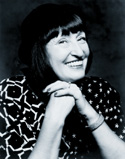
|
|
|
|
|
|
Photo Credit: Unknown |
Sheila Jordan
On this edition of Billy Taylor's Jazz at the Kennedy Center, Dr. Taylor's trio welcomes one of the most consistently creative of all jazz singers, Sheila Jordan. The show takes place in Williamstown, Massachusetts, and the crowd exhibits great appreciation for Jordan's singing and tutelage. Throughout the evening, she professes a number of times that jazz saved her life. Her honest display of passion and understanding for jazz makes this concert an unforgettable experience. Although born in Detroit, Michigan, Jordan spent the majority of her childhood being raised by her grandparents in Summer Hill, Pennsylvania. This poverty-stricken, coal-mining town would have been her demise had she not encountered jazz. At the age of twelve, she went to Detroit to visit her mother. As luck would have it, Jordan discovered jazz when she haphazardly traded for a Duke Ellington record. The album allowed her love for singing to find its focus in jazz. A year later, Jordan returned to Detroit and began attending high school. The school's jukebox played the tunes of Charlie Parker and his Reboppers. From this moment on, she would be inspired and influenced by the music of Bird. Still in her early teens, she began hanging around the local jazz scene. She befriended two local musicians--including Leroy Mitchell--who not only covered many Charlie Parker tunes but regularly put lyrics to his songs. This discussion naturally leads her and Dr. Taylor's trio into a version of her "The Bird." The tune makes use of a Charlie Parker line from Gershwin's famous, "Embraceable You." Jordan did not merely worship Charlie Parker from afar. As bebop exploded in the 1940's, she made her way to New York in pursuit of Bird and his music. As a single mother, she worked as a typist during the week, and on Saturdays she headed to the legendary jazz club, Minton's where she studied Bird's music until well in to Sunday morning. Her dedication paid off. Parker recognized Jordan's earnestness, and the two became close friends. She would later tour with Bird, and eventually she married his piano player, Duke Jordan. Her adoration for Parker remains strong today as she recalls, "I always thought he was a genius...he allowed you to be yourself." This period gave her an intimate understanding for New York, and Dr. Taylor uses her recollections to inspire a beautiful version of "Autumn in New York." When an audience member asks Jordan about Charlie Parker, the singer immediately responds by calling Bird her "teacher." Teaching, we learn, plays a huge role in Jordan's life. She began teaching at City College and still works for the University of Massachusetts. Her teaching philosophy, like her music, shows generosity and intuition. The best teachers, according to Jordan, do not rely on power to create knowledge. In terms of musical scholarship, Jordan urges singers to go to the original sheet music when attempting to learn a tune for the first time. She insists that students "not study singers off records." The best jazz singers learn their phrasing by studying the solos of Charlie Parker, Miles Davis, and Lester Young. When Jordan picks a tune to sing, she looks for melody first and lyrics second. When another audience member asks Jordan about the life as a woman in the world of jazz, the singer responds with aplomb: "It was really tough." Interestingly, Jordan points out that although she faced tremendous male chauvinism along the way, the jazz musicians themselves always treated her with dignity. Club owners, on the other hand, tended to book female acts according to looks first and musical talent second. The thread of this conversation continues when Jordan discusses the incomparable Billie Holiday. "What can you say about Billie," Jordan remarks, "the greatest singer in the world." At this point Jordan becomes obviously emotional, and Dr. Taylor uses her energy to inspire a heartfelt version of "Good Morning Heartache." The show concludes with a rousing version of "Sheila's Blues." With it, Jordan sings us through a biographical sketch of her life. The tune acknowledges the difficulties she has faced along the way, but she consistently reinforces the idea that jazz saved her. The evening concludes with Dr. Taylor's therapeutic farewell: "It's been a ball."
|
|
| |
